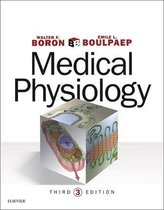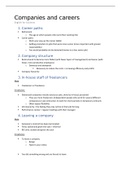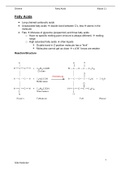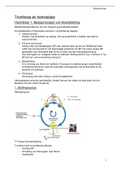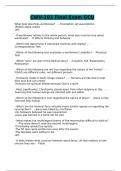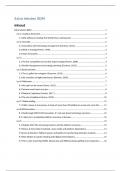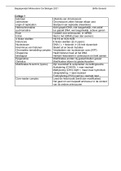Lecture 7 : Neuromuscular physiology
https://www.youtube.com/watch?v=zbo0i1r1pXA
- skeletal muscle → voluntary/ reflex control by motor neurons of somatic motor system → efferent
neurons
- motor neuron = somatic motor neuron + muscle fb it innervates
- 1 axon branch innervate an
individual muscle fiber through terminal
arborization
Synaptic transmission at the neuromuscular
junction - motor end- plate
● presynaptic vesicle : Ach
○ liberation of this vesicle :
clathrin = contracil protein
Neuromuscular junction
● synaptic cleft
● muscle basement membrane
○ synaptic basal lamina :
■ proteins (
collagen/ laminin/ agrin) : mediate adhesion
of neuromuscular junction & play important
roles in synapse dvp + regeneration
■ high
concentration of acetylcholinesterase (
AChE)
● postsynaptic membrane of skeletal
muscle (motor end plate)
○ = post-juntional folds
○ nicotinic Ach receptors (ionotropic receptors)
■ non selectiev cation channel, permeable mainly to Na+, is an ionotropic ligand-gated
Na+ channeé
● Channel remains open until the ACh is hydrolyzed, if not the channel will
close despite the presence of ACh within 1msec.
■ end plate potential (EEP) = excitatory postsynaptic potential (EPSP)
● Curara : drug that blocks the gating of ACh on the nicotinic receptors by
competing for ACh receptor sites → too week to elicit an AP
● Botulinum : toxins, decrease the quantity of ACh release by the nerve
terminals by blocking the fusion of synaptic vesicles → too week to elicit an
AP
1
, Synaptic modulation at the neuromuscular junction (NMJ)
● Synaptic facilitation (https://www.youtube.com/watch?v=Dxhab1gLSjc); short-lived enhancement of the
EEP
○ ↑in the frequency if nerve stimulation
○ ↑in mean nbr of quanta/ nerve stimulus
● Synaptic potentiation ; long-lived and pronounced increase in ACh, release that occurs after long period
of high-frequency and pronounced nerve stimulation
● Synaptic depression : ↓ in the efficency of transmitter release → a reduction in the EEP in response to a
period of frequent nerve stimulation
Drugs that enhance/ block transmission at the neuromuscular junction:
● stimulate the muscle fb by Acetylcholine-like action
○ methacholine, carbachol, nicotine
○ ACh agonists : not destroyed by cholinesterase or slowly
○ muscle spasms
● stimulate the neuromuscular junction by inactivating acetylcholinesterase
○ neostigmine, physostigmine, pyridostigmine, diisopropyl fluorophosphate
● inhibit the postsynaptic transmission at the neuromuscular junction
○ curariform drugs, can prevent passage of impulses from nerve ending into muscle, by
competing for the ACh receptor sites.
⇒ Myasthenia gravis = muscle weakness
NMJ CNS synpases
1 muscle fb ← 1 axon cell receive input from many axons of diff cells (convergence)
1 motor neuron axon innervates a small nbr of muscle fbr 1 cell may project to a large nbr of target neuron (divergence)
area of synaptic contact is huge small
muscle fbr fires once in response to one AP in motor neuron rarely AP released in postsynaptic cell consecutive to one presynaptic
AP (fewer vesicles released, may other influences are operative, etc)
transmitter is excitatory at NMJ (striated mammalian muscle fbr) transmitter may be excitatory/ inhibitory/ modulatory
acetylcholine (Ach) is the transmitter many substances in addition to Ach serve as transmitters
Nicotinic Ach receptor is part of channel (ionotropic receptor) Inotropic or metabotropic postsynaptic receptors
Skeletal muscle
● smallest contractile unit : muscle fiber cell / myofiber
● surround a sheath : endomysium
● surrounding each muscle fiber : sarcolemma
● bundles of fascicles form a muscle, covered by epimysium
Sarcomere :
● Repeating unit btw adjacent Z disks
● A myofibril is a linear array of sarcomeres stacked end to end →
striated appearance of muscle fbr
● Thin filaments
○ actin molecules, filamentous actin (F-actin), assoc w
■ tropomyosin
⇒ regulate the binding of myosin head groups to actin
■ troponin, heterotrimer consisting of :
● Troponin T ⇒ binds to Tropomyosin
● Troponin C ⇒ binds Ca2+
● Troponin I ⇒ binds to actin & inhibits contraction
2
https://www.youtube.com/watch?v=zbo0i1r1pXA
- skeletal muscle → voluntary/ reflex control by motor neurons of somatic motor system → efferent
neurons
- motor neuron = somatic motor neuron + muscle fb it innervates
- 1 axon branch innervate an
individual muscle fiber through terminal
arborization
Synaptic transmission at the neuromuscular
junction - motor end- plate
● presynaptic vesicle : Ach
○ liberation of this vesicle :
clathrin = contracil protein
Neuromuscular junction
● synaptic cleft
● muscle basement membrane
○ synaptic basal lamina :
■ proteins (
collagen/ laminin/ agrin) : mediate adhesion
of neuromuscular junction & play important
roles in synapse dvp + regeneration
■ high
concentration of acetylcholinesterase (
AChE)
● postsynaptic membrane of skeletal
muscle (motor end plate)
○ = post-juntional folds
○ nicotinic Ach receptors (ionotropic receptors)
■ non selectiev cation channel, permeable mainly to Na+, is an ionotropic ligand-gated
Na+ channeé
● Channel remains open until the ACh is hydrolyzed, if not the channel will
close despite the presence of ACh within 1msec.
■ end plate potential (EEP) = excitatory postsynaptic potential (EPSP)
● Curara : drug that blocks the gating of ACh on the nicotinic receptors by
competing for ACh receptor sites → too week to elicit an AP
● Botulinum : toxins, decrease the quantity of ACh release by the nerve
terminals by blocking the fusion of synaptic vesicles → too week to elicit an
AP
1
, Synaptic modulation at the neuromuscular junction (NMJ)
● Synaptic facilitation (https://www.youtube.com/watch?v=Dxhab1gLSjc); short-lived enhancement of the
EEP
○ ↑in the frequency if nerve stimulation
○ ↑in mean nbr of quanta/ nerve stimulus
● Synaptic potentiation ; long-lived and pronounced increase in ACh, release that occurs after long period
of high-frequency and pronounced nerve stimulation
● Synaptic depression : ↓ in the efficency of transmitter release → a reduction in the EEP in response to a
period of frequent nerve stimulation
Drugs that enhance/ block transmission at the neuromuscular junction:
● stimulate the muscle fb by Acetylcholine-like action
○ methacholine, carbachol, nicotine
○ ACh agonists : not destroyed by cholinesterase or slowly
○ muscle spasms
● stimulate the neuromuscular junction by inactivating acetylcholinesterase
○ neostigmine, physostigmine, pyridostigmine, diisopropyl fluorophosphate
● inhibit the postsynaptic transmission at the neuromuscular junction
○ curariform drugs, can prevent passage of impulses from nerve ending into muscle, by
competing for the ACh receptor sites.
⇒ Myasthenia gravis = muscle weakness
NMJ CNS synpases
1 muscle fb ← 1 axon cell receive input from many axons of diff cells (convergence)
1 motor neuron axon innervates a small nbr of muscle fbr 1 cell may project to a large nbr of target neuron (divergence)
area of synaptic contact is huge small
muscle fbr fires once in response to one AP in motor neuron rarely AP released in postsynaptic cell consecutive to one presynaptic
AP (fewer vesicles released, may other influences are operative, etc)
transmitter is excitatory at NMJ (striated mammalian muscle fbr) transmitter may be excitatory/ inhibitory/ modulatory
acetylcholine (Ach) is the transmitter many substances in addition to Ach serve as transmitters
Nicotinic Ach receptor is part of channel (ionotropic receptor) Inotropic or metabotropic postsynaptic receptors
Skeletal muscle
● smallest contractile unit : muscle fiber cell / myofiber
● surround a sheath : endomysium
● surrounding each muscle fiber : sarcolemma
● bundles of fascicles form a muscle, covered by epimysium
Sarcomere :
● Repeating unit btw adjacent Z disks
● A myofibril is a linear array of sarcomeres stacked end to end →
striated appearance of muscle fbr
● Thin filaments
○ actin molecules, filamentous actin (F-actin), assoc w
■ tropomyosin
⇒ regulate the binding of myosin head groups to actin
■ troponin, heterotrimer consisting of :
● Troponin T ⇒ binds to Tropomyosin
● Troponin C ⇒ binds Ca2+
● Troponin I ⇒ binds to actin & inhibits contraction
2

